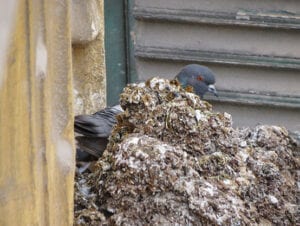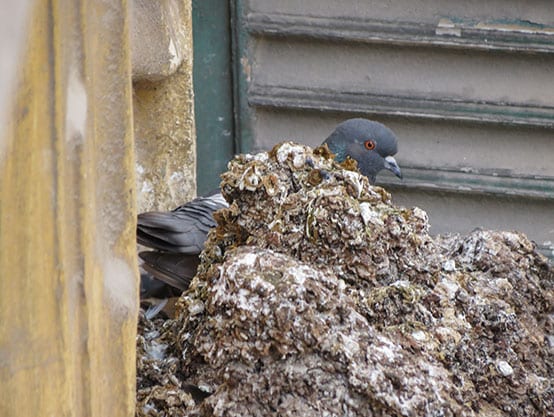Enteric illnesses remain the second largest source of communicable diseases worldwide, and wild birds are suspected sources for human infection. This has led to efforts to reduce pathogen spillover through deterrence of wildlife and removal of wildlife habitat, particularly within farming systems, which can compromise conservation efforts and the ecosystem services wild birds provide. Further, Salmonella spp. are a significant cause of avian mortality, leading to additional conservation concerns. Despite numerous studies of enteric bacteria in wild birds and policies to discourage birds from food systems, we lack a comprehensive understanding of wild bird involvement in transmission of enteric bacteria to humans. Here, we propose a framework for understanding spillover of enteric pathogens from wild birds to humans, which includes pathogen acquisition, reservoir competence and bacterial shedding, contact with people and food, and pathogen survival in the environment. We place the literature into this framework to identify important knowledge gaps. Second, we conduct a meta-analysis of prevalence data for three human enteric pathogens, Campylobacter spp., E. coli, and Salmonella spp., in 431 North American breeding bird species. Our literature review revealed that only 3% of studies addressed the complete system of pathogen transmission. In our meta-analysis, we found a Campylobacter spp. prevalence of 27% across wild birds, while prevalence estimates of pathogenic E. coli (20%) and Salmonella spp. (6.4%) were lower. There was significant bias in which bird species have been tested, with most studies focusing on a small number of taxa that are common near people (e.g. European starlings Sturnus vulgaris and rock pigeons Columba livia) or commonly in contact with human waste (e.g. gulls). No pathogen prevalence data were available for 65% of North American breeding bird species, including many commonly in contact with humans (e.g. black-billed magpie Pica hudsonia and great blue heron Ardea herodias), and our metadata suggest that some under-studied species, taxonomic groups, and guilds may represent equivalent or greater risk to human infection than heavily studied species. We conclude that current data do not provide sufficient information to determine the likelihood of enteric pathogen spillover from wild birds to humans and thus preclude management solutions. The primary focus in the literature on pathogen prevalence likely overestimates the probability of enteric pathogen spillover from wild birds to humans because a pathogen must survive long enough at an infectious dose and be a strain that is able to colonize humans to cause infection. We propose that future research should focus on the large number of under-studied species commonly in contact with people and food production and demonstrate shedding of bacterial strains pathogenic to humans into the environment where people may contact them. Finally, studies assessing the duration and intensity of bacterial shedding and survival of bacteria in the environment in bird faeces will help provide crucial missing information necessary to calculate spillover probability. Addressing these essential knowledge gaps will support policy to reduce enteric pathogen spillover to humans and enhance bird conservation efforts that are currently undermined by unsupported fears of pathogen spillover from wild birds.

a pigeon bird standing by guano manure
Pigeon Patrol Products & Services is the leading manufacturer and distributor of bird deterrent (control) products in Canada. Pigeon Patrol products have solved pest bird problems in industrial, commercial, and residential settings since 2000, by using safe and humane bird deterrents with only bird and animal friendly solutions. At Pigeon Patrol, we manufacture and offer a variety of bird deterrents, ranging from Ultra-flex Bird Spikes with UV protection, Bird Netting, 4-S Bird Gel and the best Ultrasonic and audible sound devices on the market today.
Voted Best Canadian wholesaler for Bird Deterrent products ten years in a row.
Contact us at 1- 877– 4– NO-BIRD, (604) 585-9279 or visit our website at www.pigeonpatrol.ca
Pigeon/Pigeon Patrol / Pigeons Roosting / Vancouver Pigeon Control /Bird Spikes / Bird Control / Bird Deterrent / Pigeon Deterrent? Surrey Pigeon Control / Pest /Seagull deterrent / Vancouver Pigeon Blog / Birds Inside Home / Pigeons in the cities / Ice Pigeons/ What to do about pigeons/ sparrows , Damage by Sparrows, How To Keep Raccoons Away, Why Are Raccoons Considered Pests/ De-fence / Pigeon Nesting/ Bird Droppings / Pigeon Dropping/ woodpecker control/ Professional Bird Control Company/ Keep The Birds Away/ Birds/rats/ seagull/pigeon/woodpecker/ dove/sparrow/pidgeon control/pidgeon problem/ pidgeon control/flying rats/ pigeon Problems/ bird netting/bird gel/bird spray/bird nails/ bird guard

